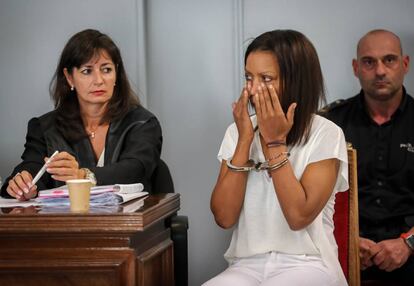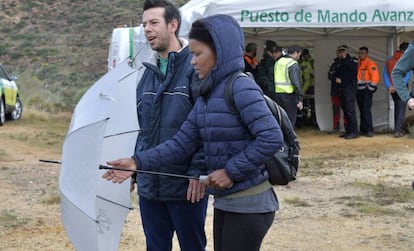Spanish child Gabriel Cruz clung to life for up to 90 minutes, says lawyer at trial
Almería jury hears new details about the death of the eight-year-old in southern Spain 18 months ago at the hands of self-confessed killer Ana Julia Quezada

Gabriel Cruz, an eight-year-old child who was killed in southern Spain in February of last year, clung to life for 45 to 90 minutes after his alleged murderer struck him, said the family’s lawyer at the trial that began Monday in Almería.
Ana Julia Quezada, 45, who was the girlfriend of Gabriel’s father at the time, has already confessed to the crime, and faces Spain’s maximum penalty, permanent reviewable prison – the equivalent of life with a possibility of parole after a fixed term – if the jury finds her guilty of murder.
It is impossible to describe the parents’ pain
Francisco Torres, lawyer
Her defense is pleading reckless homicide, claiming that the child attacked Quezada with a hatchet and that she acted in self-defense.
The Cruz family lawyer, Francisco Torres, on Monday provided details of the circumstances surrounding the child’s death, based on private medical examiner reports. Torres underscored the defendant’s “complete lack of scruples” as he addressed the seven women and two men who make up the jury that will decide Quezada’s fate.
Torres told the court that he has been speaking with Gabriel’s parents, Ángel Cruz and Patricia Ramírez, every single day for these last 18 months. “It is impossible to describe their pain,” he said. The parents, who will provide testimony at a closed-door hearing on Tuesday, are still in treatment for post-traumatic stress disorder.

The case attracted international media attention after Gabriel went missing from his grandmother’s house in Níjar, inside the Cabo de Gata national park, on February 27, 2018. A huge search operation got underway, in which Quezada actively participated, making regular appeals on television for his safe return. Around two weeks later, the police arrested her as she attempted to move the child’s body in the trunk of her car.
At the trial on Monday, Torres said that Quezada took Gabriel from his grandmother’s house when the father was not around, and drove him to a secluded family property in Rodalquilar that they were renovating. It was there that she attacked him.
“Then she smoked a few cigarettes, painted a door, dug the grave, and an hour later realized that Gabriel was still breathing and strangled him,” said Torres.
No intent to kill
Sitting next to her lawyers, Quezada shook her head and dried tears from her eyes during the court session. A hairdresser who moved to Spain from Dominican Republic in her twenties and lived in Burgos before settling down in Almería, she confessed to the crime soon after her arrest.
Her defense lawyer, Esteban Hernández, on Monday asked the jury for “good sense” in this “tragic matter,” and insisted that the main issue is to determine “whether she was aiming to kill him, or just wanted him to be quiet.” The evidence, he says, confirms his client’s claim that the child picked up an ax to play with, and that when she reprimanded him, he insulted her. She then covered his mouth, and later realized he was not breathing.
“It is our understanding that she had no intention of causing harm,” he said. As for Quezada’s behavior afterwards – she participated in the search operation and planted one of his shirts to draw attention to the wrong spot – her lawyer said it was “quite common.”
“Lack of humanity”
In April 2018, investigating judge Rafael Soriano noted in his decision to deny Quezada bail that “the evidence reveals a lack of feeling and humanity that she herself recognizes, and which, if confirmed, would represent pure cruelty.”
The investigating judge also noted that during the search, she “gave a false appearance of concern for the disappearance and fate of the boy” and “kept up the show, going even further and pretending to find a shirt belonging to the boy.”
“When you do something wrong, you don’t announce it,” he said. He is seeking a conviction for reckless homicide, which entails a maximum prison sentence of 15 years.
But the public prosecutor, Elena Fernández, said that Quezada “deprived the child of life in cold blood and with absolute contempt.” She used the words “pretense,” “manipulation,” “deceit,” and “overacting” to describe the defendant’s behavior during the search operation.
On Tuesday morning, Quezada took the stand and confirmed that she killed Gabriel. Asked by the public prosecutor Elena Fernández Lora whether she “ended the life of the son of your partner,” she answered: “Yes.”
“I saw Gabriel with an ax. I told him, ‘Put it down, you could hurt yourself.’ He started to scream, ‘You can’t boss me around, you’re not my mother. You’re black, you’re ugly, your nose is ugly, I don’t want you to be with my father. I want my father to marry my mother. I want you to go back to your country’,” the defendant told the court.
“I simply covered his mouth, I didn’t want to hurt the child. I just wanted him to be quiet. I didn’t want to kill the child,” she said.
As for the shirt belonging to the child that she planted in a bid to throw the Civil Guard off the trail, Quezada said that she had left it there because she wanted to be arrested. “I wanted to get caught, because I was unable to say it with my own words, I wanted them to apprehend me,” she told the court.
Dozens of witnesses and experts have been summoned to the provincial court of Almería, where the trial is scheduled to end on September 19 after nine sessions.
English version by Susana Urra.
Tu suscripción se está usando en otro dispositivo
¿Quieres añadir otro usuario a tu suscripción?
Si continúas leyendo en este dispositivo, no se podrá leer en el otro.
FlechaTu suscripción se está usando en otro dispositivo y solo puedes acceder a EL PAÍS desde un dispositivo a la vez.
Si quieres compartir tu cuenta, cambia tu suscripción a la modalidad Premium, así podrás añadir otro usuario. Cada uno accederá con su propia cuenta de email, lo que os permitirá personalizar vuestra experiencia en EL PAÍS.
¿Tienes una suscripción de empresa? Accede aquí para contratar más cuentas.
En el caso de no saber quién está usando tu cuenta, te recomendamos cambiar tu contraseña aquí.
Si decides continuar compartiendo tu cuenta, este mensaje se mostrará en tu dispositivo y en el de la otra persona que está usando tu cuenta de forma indefinida, afectando a tu experiencia de lectura. Puedes consultar aquí los términos y condiciones de la suscripción digital.








































